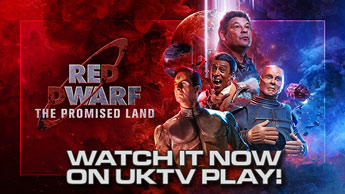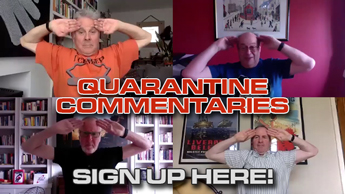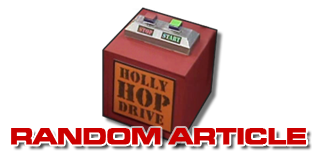 |
Flash Flibble Mr Flibble's interview with cinematography legend Gil Taylor continues with a look at three more of his classic films - horror groundbreaker The Omen, camp sci-fi flick Flash Gordon and Beatles-fest A Hard Day's Night... |

Andrew Ellard
Always a bit of a music buff, Mr Flibble's first question was: What was it like working with The Beatles on A HARD DAY'S NIGHT? (1964) Because it really defined how pop videos now are made and shot...
If that had been in colour, it would have been fantastic. It was a pity. Dick [Lester] and I had done a film called It's Trad, Dad (1961), which was one of the first pop-type movies, and quite successful, quite fun to do. Dick's a great musician, he's a musical man, and all the time he's got an itch for, 'What are we doing that's different?' Never stops. 'Let's get that, a bit of that! Let's get this!' You can tell him anything, and he listens all the time - ears everywhere.
Did you see anything of Brian Epstein - he must have been the target for a lot of hopeful bands...
There were something like a thousand groups, and they all used to send in songs to [Brian] Epstein. And Epstein was very cunning - if they were any good, he used to say, 'Come mid-week,' because mid-week the office girls and kids came in and were charged seven and sixpence for lunch and to listen. And these kids would listen to the bands - and if they gave roaring claps he would then have them [the bands] in again.
So when this film came along we met the boys - at that stage their mothers hadn't got bathrooms in their houses, and they lived in a poverty-stricken area. I went around and photographed the place. It was all pretty grim.
Mr Flibble said he could never make the transition into music - Andrew would have to tell everybody what he was singing! How did THE BEATLES function as actors?
Dick put a microphone under their seats so they could collect the dialogue, 'cause they couldn't remember anything. Dick said, 'We'll stick it in afterwards.' So we got a whole tape of Beatles dialogue, about everything, recorded for real.
When they started the film, especially if they had an audience in, they played God Save the Queen. I had six cameras and six Best operators (because they were all out of work), and they put 10:1 zooms on and they used to zoom in on these kids.
How did they get on with the crew?
The boys themselves were no trouble, they did what they were meant to do. They rather cut themselves off as a group. I think some of that was embarrassment. When they went into a Chinese restaurant - because we all went in - they asked for jam butties.
We took a train, [which] was supposed to be a secret, down to Devon to [shoot] the train stuff - and all the stations [on the way] down were told. The publicity people put it all out! Everywhere we went, there were people, Dick Lester was amazed, people kept coming. How did they know? They were told to come.
Ringo would look out of the window and say, 'F**k off!' I used to say, 'How can you say that when they're your fans? You wouldn't be anything but for [these] people, all these kids.' That's the way he was built then, he was a bit like that. They were all very basic. Of course now they're all quite different.
Mr Flibble said he never let stardom alter him, before asking one of his assistants to be a dear and grab him a bottle of slightly sparking water from Harrods. He then asked Gil about his time on THE OMEN (1976)...
I did The Omen with Richard Donner, and I had a wonderful film with them. He'd done Kojak and that sort of thing - but as I recall this was his first Panavision film. It was marvellous, I loved going in every day.
Mr Flibble was temporarily distracted as he examined Andrew's head for numerical tattoos. Andrew asked if Gil was aware of creating The Omen's specific visual sense?
We wanted a special look, and I tested just about every GAUZE there was in the world, and couldn't find one. This stuff looked marvellous but it wasn't right. So I came home one weekend and I said to Diane, "Will you go out and try and find me something?"
So she came back on the Saturday with a silk chiffon - black, square. On the Sunday morning we had to photograph the start of the film - a rugby-football match on the lawn in front of Windsor Castle. I had two cameras with 10:1 zooms, and Peter Beale, the boss from 20th Century Fox, was playing to show off.
The sun started very low, yellow, and so the boys said to me, 'What gauze should we use?' So I pulled these out of my pocket and said, 'Stick one over each lens.' I thought, 'I'm going to get the sack for this for a start...' Anyway, we did the rugby-football match, and the following Monday - I didn't go into rushes for some reason, but Dick Donner and Harvey Bernhard went in and I met them coming out - and they both said, 'You bastard...you've done it! You've done it!' We started the shoot the next day - and they said we worked miracles - and that's how it was all shot.
So how confident were you that it would work?
I wasn't! But it did come off. I was amazed - I thought I'd get the Oscar. I got the Golden Globe. The film was marvellous to work on, from start to finish. It was like a big family. The mood of the thing, all the way through; we shot in the winter, just before Christmas.
We were in these old houses, like the old Guinness house - and we were told that we'd been CURSED and that somebody would die. Sadly, somebody did. A beautiful girl, she was a model, and she fell in love with the assistant art director, special effects. They left the film early to do A Bridge Too Far. He had an open-top two-seater and it was after midnight, they were motoring along this pitch-black road, and one of these tanker-transporter type things [came] across the road - and they went underneath it. It was tragic, she was killed outright. And at the side of the road when they stopped was a billboard [for] The Omen. He was seriously ill, but he recovered.
How did your years of experience pay off on The Omen?
My son, Peter, got his first break because the operator [Gerry Anstiss] fell sick several times and he took over. With respect to Gerry, Dick Donner wanted to keep Peter - because he's got a great sense of humour and Gerry is a permanent moaner. A very good operator, but he moans all the time. It's like having a blow-fly around corned beef.
It's all a question of involvement, and I've always been terribly involved. I love operating, so the operators never minded if I took over a shot.
How did you compensate for the complexity of the SHOOT?
I worked the simplest way, did didn't use complicated, silly set-ups. I thought, 'This is an on-looker watching a performance, why bugger about?' And I still had lots of movement. With a 10:1 zoom I could alter the size of the frame, so I sometimes had two assistants on it - or did it myself with one hand, and operated that shot myself.
Strange to say, The Omen was very similar to Repulsion (1965) in its intimacy. Because Dick wanted to be on top of the actors all the time, he didn't want to miss anything, and he couldn't stand it if you had long-focus lenses on, so we tended to be close to the actors, or the dog, or whatever. But Dick loved the intimacy.
Mr Flibble's water arrived, but it was room-temperature, so he sent his assistant away for ice. Andrew chose this moment to bring up FLASH GORDON (1980)...
That was a dreadful film wasn't it!
It was extremely camp - but it had a very specific look...
I played a very large part in the background with that. We were fiddling about with Italian art directors. It was a load of beautiful rubbish that bore no relation to 'Flash Gordon.'
There's Dino [De Laurentiis] going mad because he's spent �2 million on the costumes, the special effects, and wasn't getting anywhere. So he called me into the office, he said, 'What's wrong?' I said, 'Well what's wrong is that you've paid thousands of pounds for these [Flash Gordon] magazines and you're doing some money film which has nothing to do with Flash Gordon.'
And how did he feel about that?
He wasn't happy, and he was having big arguments with his director, so I said, 'Why don't you just strike it and do a film about Flash Gordon?' He then got another director in, a bit later, and sadly he came through with not quite what I wanted. It was a compromise, to be quite truthful. It's the first time anybody's ever used a megawatt of light on a backing, along a blue backing 200 feet long and 100 feet high.
That's why I invented the 'Dino', the one-kilowatt lamp, a blue filter bringing it up to 200 Kelvin. Because otherwise you had to use arc lights, and there weren't enough arc lights about. So I developed this lamp, I had the time [because] we hadn't started production, to design it.
Did you enjoy working on the production?
It was a fun film. We had delightful girls, actresses, absolutely sweet. They were unbelievable - the Americans turn out such lovely ladies. Very beautiful and very gutsy. Those romps they had on the bed, the fight - they got heavily bruised. It was so serious that I almost wanted to step in there and stop it before somebody got hurt...
In the final installment of Gil's interview, he'll be talking about his time with Alfred Hitchcock, Roman Polanski and being Ice Cold in Alex. If you don't tune in... Mr Flibble will be very cross.














